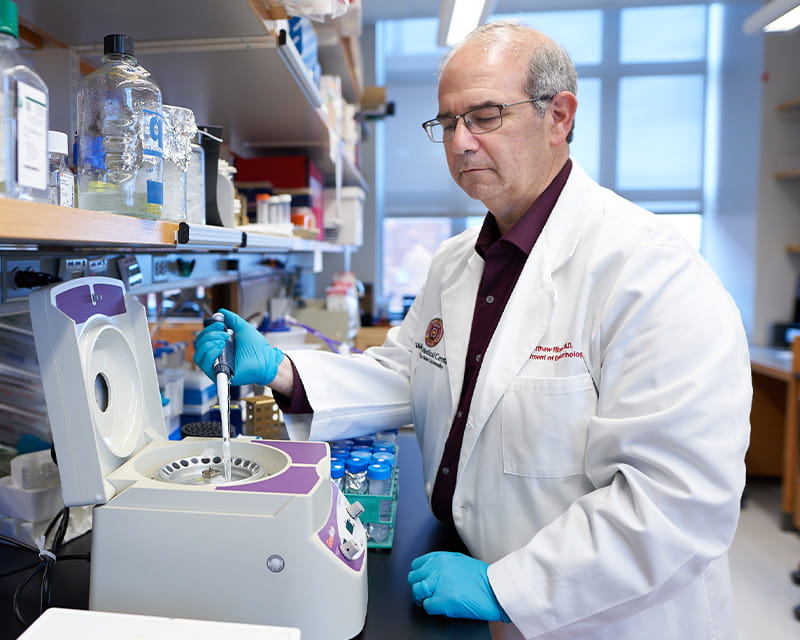
Studying “brake failure” in thyroid cancer metastasis
 Data, partnerships key to improving risk factors for diabetes, cardiovascular disease
Data, partnerships key to improving risk factors for diabetes, cardiovascular diseaseFor Joshua Joseph, MD, work is all about connecting to others and connecting the dots.
An endocrinologist with The Ohio State University Wexner Medical Center, Dr. Joseph partners with colleagues and communities to translate epidemiological findings into improved health. He’s focused — with a health equity lens — on reducing risk factors for cardiovascular disease and diabetes.
For his work, Dr. Joseph was recognized in 2021 with the Columbus CEO’s Healthcare Achievement Award in the Pathway to Population Heath category, and with Medical Mutual’s Philanthropist of the Year Pillar Award for Community Service. In 2020, he was named a “40 under 40” Leader in Health Care by the National Minority Quality Forum, and Cell Mentor included Dr. Joseph among their list of 100 inspiring Black scientists in America.
“These awards are less about me and more about the team that has been working in this space to not only improve individual health but also population health, particularly among communities that have been underinvested in and disadvantaged over time,” Dr. Joseph says.
And this team’s work is making an impact. Using national data of defined risk factors for cardiovascular disease and diabetes — and in partnership with community-based organizations and agencies — they’ve built programs that go beyond simply telling people what to do to get and stay healthy.
“We’re not only saying it’s important to exercise or eat right, but we’re also actually helping people modify their behaviors to be successful,” Dr. Joseph says.
Dr. Joseph’s team and collaborators have created several evidence-backed initiatives, including an 11-week exercise program called Exercise is Medicine, which can be ordered by a physician like a prescription. The program is offered at several locations around Columbus for ease of access.
The team also created a six-week professional-led cooking class called Cooking Matters for Diabetes. Developed by a registered dietitian and led by a chef and certified diabetes care and education specialist, the course is held at a community location and teaches participants how to shop and cook affordable and nutritious meals for families.
“Historically, we’ve thought about diabetes management from the vantage point of a provider,” Dr. Joseph says. “But our work goes beyond that to include the community and address social needs.”
The most extensive program created by Dr. Joseph and his team, in partnership with the African American Male Wellness Agency, is called Black Impact 100. The six-month lifestyle program is built on the American Heart Association’s Life’s Simple 7, an initiative to raise awareness about seven risk factors associated with cardiovascular disease.
“There’s been a lot of work around these risk factors and cardiovascular disease, specifically, but we wanted to know how these factors — all seven, not just blood sugar — affect a person’s risk for diabetes,” Dr. Joseph says.
He and his team published a series of papers showing that better measures across Life’s Simple 7 could reduce overall diabetes risk.
“We then took glucose out of the mix and looked at the other six factors,” Dr. Joseph says. “Improvement in these factors lowered diabetes risk for people without prediabetes by 60% to 80% over 10 years.”
From this research came Black Impact 100. The goal of Black Impact 100 is to improve the health of Black men through ongoing research, application of that research and community engagement.
“Black men have the worst levels of Life’s Simple 7 and a lower life expectancy than men or women of any race or ethnicity in the U.S.,” Dr. Joseph says. “It’s a population group in need of health improvement. But what we know from the literature is that multi-level interventions addressing many factors in someone’s life are critical to improving cardiovascular health.”
Black Impact 100 enrolled 74 men who were then split into six teams across six community locations. They met with a personal trainer and health coach and participated in weekly group exercise and health education.
The men were given weekly goals for physical activity and nutrition. The program also incorporated grocery store tours, the Ohio State Wexner Medical Center’s Mobile Education Kitchen and mental health education and resources. Surveys assessed social needs and identified those in need of support.
“Our Black Impact 100 data shows improvement in Life’s Simple 7, as well as improved mental health and decreased non-medical health-related social needs,” Dr. Joseph says. “Our next step is a larger study incorporating both an intervention and control group.”
 The African American Male Wellness Agency is one of many groups with which Dr. Joseph and team are connected. In August 2021, they set up at the agency’s annual African American Male Wellness Walk, where they conducted hundreds of screenings for Life’s Simple 7 and shared information about research studies. (It was at a previous walk where Dr. Joseph and team recruited for Black Impact 100.)
The African American Male Wellness Agency is one of many groups with which Dr. Joseph and team are connected. In August 2021, they set up at the agency’s annual African American Male Wellness Walk, where they conducted hundreds of screenings for Life’s Simple 7 and shared information about research studies. (It was at a previous walk where Dr. Joseph and team recruited for Black Impact 100.)
“Building strong partnerships is the most important thing about the work we’re doing,” says Dr. Joseph, who has formed relationships with state and local public health agencies, area YMCAs and the Columbus Recreation and Parks Department, to name a few.
“We are translating epidemiology out to people and populations,” Dr. Joseph says. “We can’t do that without collaboration, partnership and community engagement. As we build real, earnest relationships, not just transactional ones, it becomes clear how we all can work together to advance the health of our communities.”